Pros:
– Enjoyable and customisable sound output
– Support for LHDC 4.0 codec and Google Spacial Audio
– Stylish design, comfortable in-ear fit, good passive noise isolation
– Ingress protection for buds as well as charging case
– Wear detection, multipoint support
– Useful companion app with more customisation options
– Good battery backup, supports wireless charging
Cons:
– Average ANC for the segment, transparency mode sounds cosmetic
– No support for LDAC codec (yet)
– No volume control on buds
Price: Rs 11,999
Rating: 4/5
After a year and a half, the successor for the OnePlus Buds Pro has arrived. The OnePlus Buds Pro 2 claims to offer a lot of enhancements in multiple areas right from the driver configuration to active noise cancellation (ANC) to battery backup. Does all this actually translate into a much-improved performance as compared to its predecessor? Let’s find out.
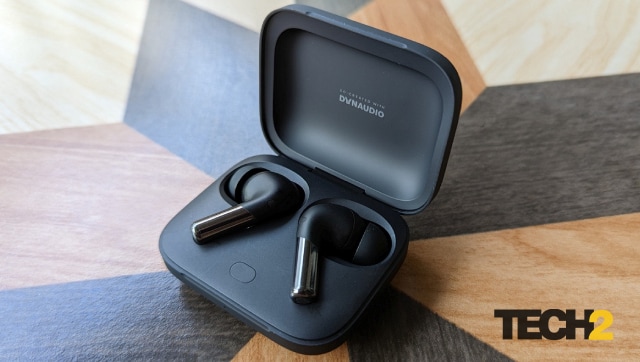
OnePlus Buds Pro 2: Design and Comfort (8/10)
As far as the design goes, the Buds Pro 2 looks almost identical to the Buds Pro. The build quality is solid with the body sporting a smooth matte finish, while the stems are glossy. The combination looks good but the stems do attract a few smudge marks. Each earbud weighs under 5 grams each. The preinstalled mid-sized silicone tips worked best for me and offered pretty good passive noise isolation. Two more pairs of tips are included in the bundle to choose from.

The buds have an IP55 rating for dust and fluid resistance, and the charging case retains its IPX4 rated moisture resistance. Just like the buds, even the case looks similar to that of its predecessor, just a little larger and with Dynaudio branding in addition to the OnePlus logo. The case is well-built too, quite pocketable and has the same matte finish as the buds. You get a tiny charge indicator LED at the front and a USB-C port at the back. It hosts a 520 mAh battery and is actually lighter at 47.3 grams. The case also supports Qi-certified wireless charging.
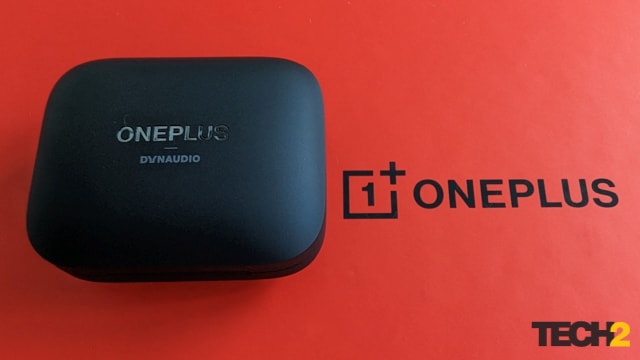
The earbuds sit nicely into the ears without any discomfort even after wearing them for a few hours. While the fit seems slightly better than before it isn’t the most snug. Having said that, they generally stay in place during jogs or workouts. Though they didn’t pop out, I did feel the need to adjust them occasionally. The pressure sensitive pinch controls have been retained, and I personally find them better than standard touch controls. More on that in a bit.
OnePlus Buds Pro 2: Features and Specifications (8.5/10)
Just like its closest competitor, the Oppo Enco X2, OnePlus has opted for a dual-driver setup in the Buds Pro 2. Each bud has an 11 mm dynamic driver to handle the lows and mids and a dedicated 6 mm tweeter mainly for the high-end frequencies. Each earbud also has three microphones for ANC/Transparency and making calls. Add to that wear detection sensors to pause the audio when you remove a bud from your ear, and resume when you put it back on. The earbuds also support multi-point connect to pair them with two devices simultaneously.
The OnePlus Buds Pro 2 is Bluetooth 5.3 compliant, and supports SBC, AAC and LHDC 4.0 audio codecs. LHDC is not a readily available codec, and if you do not have a phone that supports it, you will have to make do with AAC. Support for LDAC codec would have been better due to its much wider availability. OnePlus can take a leaf out of Oppo’s book, who added LDAC support on the Enco X2 (which has specs similar to the Buds Pro 2) post launch. For what it’s worth, OnePlus does promise support for LHDC 5.0 in the near future. The latency can go as low as 54 ms on these earbuds.
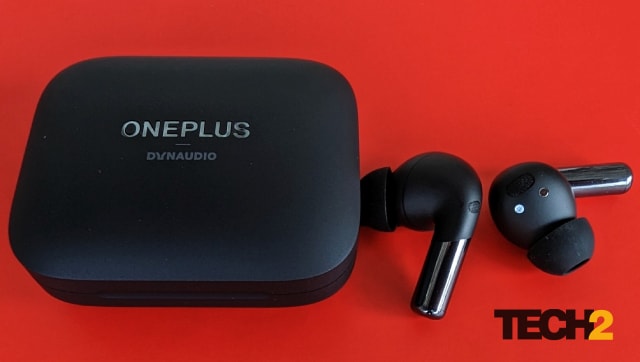
Just like the older Buds Pro, these earbuds have pressure-sensitive controls instead of standard touch inputs. You need to pinch the stems once, twice, thrice or pinch and hold to perform the designated tasks. You do not get undesired actions due to accidental touches here, which is why I prefer these over normal touch gestures. When you pinch the stems, you hear a click to confirm the input.
The controls can be configured through the Bluetooth settings on OnePlus phones (OnePlus 6 or newer). If you do not get the options, you will need to update the ‘Oppo’ Wireless Earphones app (yes!) on OnePlus phones. HeyMelody app lets you configure these earbuds on other phones. Unlike its predecessor where you could only configure the triple pinch gesture, you can assign different functions to single, double and triple pinch gestures. However, you still don’t get an option for volume control here.
You can choose between four ANC modes that are now called Mild, Moderate, Max and Smart (hello Oppo). The Max mode can reduce ambient noise up to 48 dB; a jump of 8 db from the Buds Pro. To be honest, the noise reduction seemed exactly the same to me in the first three modes. Smart is meant to automatically switch between the three modes depending on the quantum of ambient noise, and it does a pretty decent job. So it’s best to select Smart ANC.
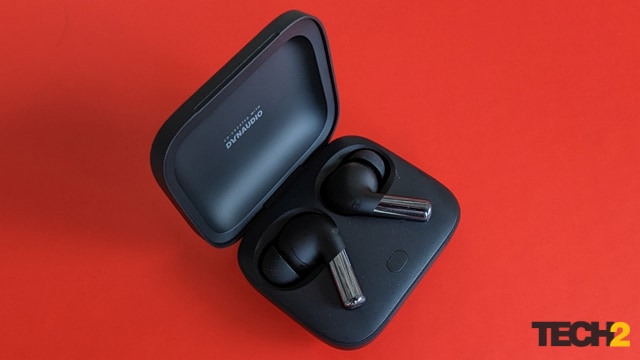
The OnePlus Buds Pro 2 also lets you create your unique Audio ID (which is now called Golden sound) using a listening test that determines your hearing profile based on your sensitivity to different sounds. It boosts certain frequencies to produce a more fuller sound for your ears. The configuration is a little different now, but the end result is better than before. Certainly worth a shot; you can always try again or disable it if you don’t like the results.
You also get the usual four OnePlus sound presets – Balanced, Bold, Serenade and Bass, tuned by Dynaudio this time, along with a 5-band equaliser to create your own profiles (other than Golden sound). The latest firmware (165.165.101) update also adds the ‘Hans Zimmer Soundscape Tuning’ preset and BassWave bass enhancement. Zen Mode Air has been retained, which plays one of the five white noises of your choice to help you relax or sleep. The chosen noise is stored on the buds and can be played by pinching and holding either of the buds for 3 seconds.
OnePlus Buds Pro 2: Performance (8/10)
Pairing these earphones with the phone is a standard process. It also supports Google Fast Pair. The connection stays strong for the specified 10 metres with a clear line of sight, but drops drastically with a concrete wall in between. As long as the earphones and the source device are in the same room, this shouldn’t matter. Multi-point is supported right out of the box but it needs to be enabled from the Bluetooth settings or the HeyMelody app.
All the ANC modes noticeably reduce several low frequency ambient sounds like whirr of a fan or the buzz of an AC. When outdoors, even the traffic noises are filtered out reasonably well, but it cannot keep out too many midrange frequency sounds. Sony has spoiled us in this department, and the ANC here is not in the league of Sony WF-1000XM4 or even their Linkbuds S. It is comparable to the Oppo Enco X2 though that sells for a similar price. The Transparency mode here sounds a bit cosmetic rather than natural, and can use some improvement.
We have already seen a couple of firmware updates since I started testing the OnePlus Buds Pro 2, and there has been a bit of an improvement in sound quality after each of those. For some reason, these buds would sound noticeably different with ANC on and off, and that gap has been bridged significantly after the latest update. You can still hear the difference in low end frequencies if you listen carefully. The bass feels slightly tighter with ANC off.
There are a lot of sound tweaks to play around with to tune the output to your liking. As I mentioned earlier, you get 5 sound presets along with a 5-band equaliser to create your own presets. The latest firmware update (v165.x) added a BassWave feature too that gives you the option to increase or lower the bass without going to the equaliser or creating a new preset. Almost all the preinstalled profiles have boosted bass, except the Hans Zimmer preset that was added in the new update, which to be honest, sounds a tad dull.
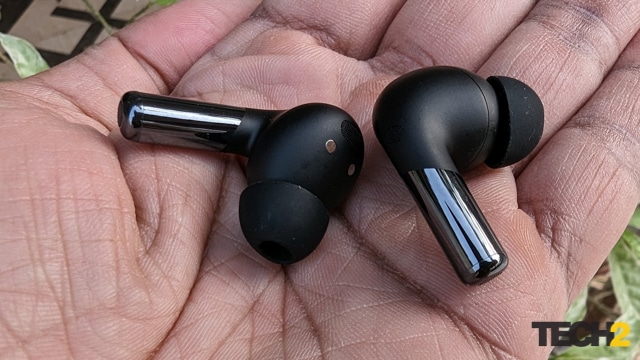
The Buds Pro 2 are among the loudest around and are perfectly audible even at 50% volume level. However, the default sound favours the lows and remains noticeably bass-heavy. Actually, the sound profile is broadly V-shaped with boosted lows and highs, and recessed mids. For best results, simply open the equaliser and boost the midrange frequencies a bit for better balance. Post that, the output feels a lot lively and enjoyable across various genres of music.
The extra bass, though mostly tight, does mask the lower end of the midrange spectrum, and boosting the mids through the equaliser makes sense. The vocal clarity is quite good here, be it vocals in music or dialogues in movies or web series. The sound is quite punchy when watching content on Netflix and Prime Video, and you get Dolby Atmos compliance too. I did not face any latency issues when watching videos. You also get Google Spacial Audio support with certain content and these earphones support Dolby Head Tracking too, which seems a bit gimmicky for now and only works with OnePlus 11 5G at the moment.
Moving on, the highs have a good amount of sparkle yet do not sound sibilant. They are tempered quite well in comparison to its predecessor. The overall detail in sound is pretty good and imaging is handled well. The soundstage seems to have improved with the latest firmware update and is reasonably broad for the category. In comparison to the Oppo Enco X2, which is similar in specs and pricing to the Buds Pro 2, these OnePlus buds produce more pronounced bass, while the Oppo sounds more detailed.
OnePlus Buds Pro 2: Call quality (7.5/10)
The call quality on the OnePlus Buds Pro 2 is better than its predecessor’s but not the best in the segment. The person on the line could hear me clearly for most parts but complained that my voice sounded a touch softer as compared to the phone microphone. The wind noise suppression works well here, and most of the traffic noise was kept in check too barring the high pitched honks (understandably). The soft hiss that could be heard on the Buds Pro is gone now, which is good.
OnePlus Buds Pro 2: Battery life (8.5/10)
The battery backup on the Buds Pro 2 is impressive. The advertised battery figures are based on the use of AAC codec and at 50% volume, wherein they are expected to last for 6 hours with ANC on and 9 hours without it. Along with the case, those figures read 25 hours and 39 hours respectively. While the loudness was close to 50% during the course of testing, I used the LHDC codec throughout. Even with that, the numbers weren’t bad at all. With ANC on, the buds lasted close to 5 hours, and without ANC, I could push them closer to 7 hours.
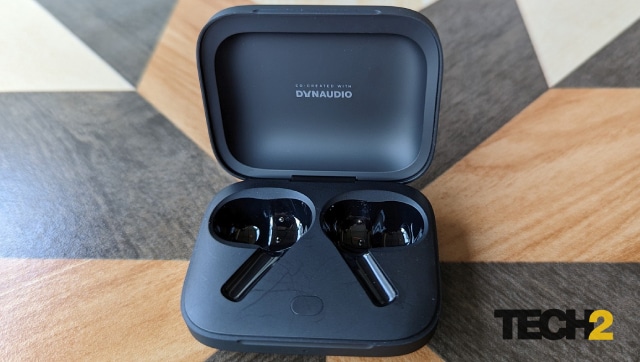
The case can recharge the buds thrice more comfortably, thus taking the overall battery backup between 20 to 30 hours, with and without ANC respectively. That is perfectly acceptable battery life for the segment. The OnePlus Buds Pro 2 supports quick wired charging, and 10 minutes of charge gives you close to 3 hours of play time on the buds with ANC off, and close to 10 hours overall with the charging case. That’s quite impressive. The battery status of each earbud as well as that of the charging case is visible on the phone/companion app.
OnePlus Buds Pro 2: Price and verdict
The OnePlus Buds Pro 2 is priced at Rs 11,999 with a one year warranty. The price may be Rs 2,000 higher than that of the Buds Pro at launch, but it does bring a lot of improvements and new elements to the table. Specs aside, the sound quality, call quality and battery life are now better on the Buds Pro 2, and you get a lot more sound and controls customisations which were missing on its predecessor, thus justifying the price difference.
As for alternatives, the Oppo Enco X2 is the biggest threat. Not only is it a thousand Rupees cheaper but also offers more refined sound with better balance between the three frequency ranges. The Buds Pro 2’s output is more punchy, and it offers better battery backup and more sound tweaks in comparison, making the contest more even. Another option to consider is the upcoming OnePlus Buds Pro 2R for a good 2K less, if you do not care about wireless charging or Head Tracking. All other features of the Buds Pro 2 are available there. Take your pick.
from Firstpost Tech Latest News https://ift.tt/bsuQOVM

No comments:
Post a Comment
please do not enter any spam link in the comment box.